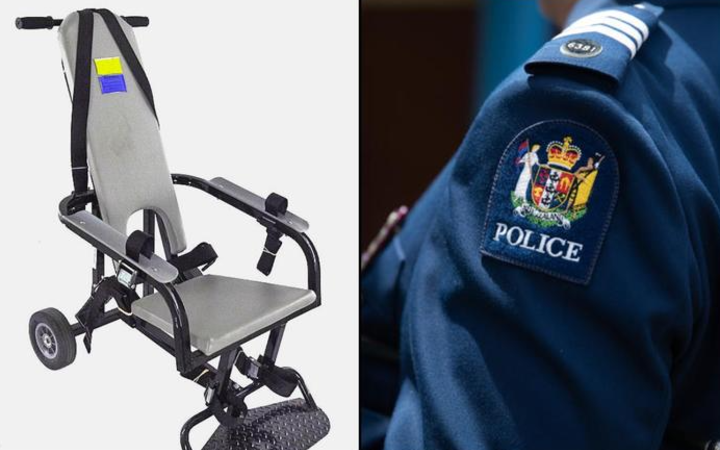
The chairs use leg, waist, wrist and chest straps to restrain a person deemed at risk of seriously harming themselves or others.
Behaviour that may warrant their use could be a person hitting a cell door or wall with their head or body, police say.
Between 2015 and 2020 police strapped 38 young people into restraint chairs, some more than once.
Justice advocacy group Just Speak director Tania Sawicki Mead said it should not be happening.
"These numbers speak to horrific experiences that young people are having in the so-called care of police," she said.
"I think that any child being held in a restraint chair which locks their arms, their neck, their body to a chair, just should never happen."
In 2020, restraint chairs were used three times on young people with one incident involving a 13 year old.
Victoria University of Wellington clinical psychologist Dougal Sutherland said their use would be traumatic.
"You know there's been a 14 year old and 15 year olds. Look, it is super young for that sort of restraint to have to be used," he said.
"One can only imagine the, you know, the situation that might have led to that..."
"I can also only imagine that it would have caused the young person a heck of a lot of stress and possible trauma as a result of being in that type of restraint."
Dr Sutherland said the mental health system was moving away from using forced restraint.
In a 2017 report funded by the United Nations, New Zealand was criticised for its use of restraint chairs.
It described them as 'inherently degrading' and recommended to New Zealand Police that they be abolished and replaced with less restrictive methods.

"The sooner the better. I mean let's face it, children in a mental health crisis need the best expert care, not to be tied down in a restraint chair in a police station.
"That's not what we want. You imagine it's hard enough for an adult, but for a child? There must be better ways."
The use of the chairs by police on teenagers was also symptomatic of wider problems within the youth mental health system, which was creaking at the seams, he said.
"There is not enough crisis mental health services for young people. It shouldn't fall on the police to be using outdated, old fashioned, almost draconian restraint chairs. We must do better."
Independent Police Conduct Authority chair Judge Colin Doherty said the organisation had received no complaints about the chairs being used on the teenagers between 2015 and 2020.
In adult cases, Doherty said the chairs were generally used on people having a mental health crisis and displaying extreme violent behaviour, often times to themselves.
Police were also more often becoming the first responders to callouts involving a mental health crisis, he said.
"Police have to respond, and they do, and they do their best. Our criticism has been that they are not the most appropriate people to be dealing with someone in a mental health crisis," he said.
"While they might have rudimentary training about how to react to people, they are not mental health specialists."
Doherty said there needed to be better resourcing for the appropriate people to be able to respond to crisis callouts.
There had been some trials conducted in Wellington where a team of police and mental health crisis experts responded to incidents.
"So it's on the radar but it needs in my view to be properly resourced and rolled out right throughout the country."
Police declined to be interviewed, and instead provided a detailed statement to RNZ.
Acting director of capability Jason Ross said the chairs were a last resort option where officers would balance dignity and rights against safety.
"In an instance where it is deemed using a restraint chair is the most appropriate course of action, at least one staff member present must be trained and certified in the use of this mechanical restraint," he said.
"This person will manage and lead the situation, providing guidance to other staff assisting."
Inspector Ross said police acknowledged recommendations made in 2017 to use a less restrictive restraint method, "however, as communicated in previous feedback to the Human Rights Commission, the report did not offer any clarity on what less restrictive options might be available to police."
He confirmed police were now reviewing the use of all equipment used in custody environments including restraint chairs, blankets, handcuffs and spitting hoods.












